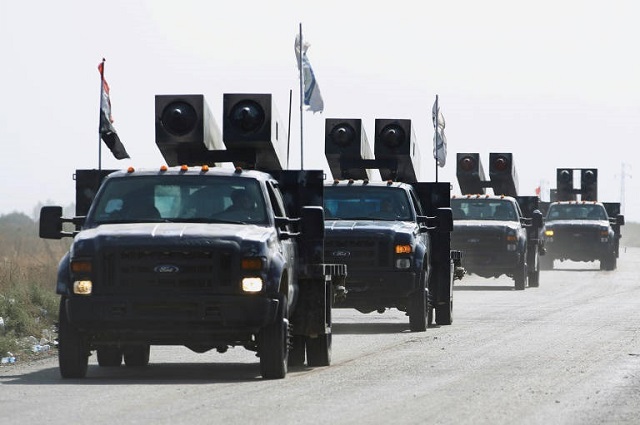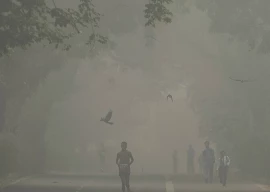
"Before we couldn't proudly declare that we are Turkmen, now our flag is flying over Kirkuk's citadel again," said Omar Najat, 23.
Three weeks before, the disputed city's Kurds were gleefully taking part in a Kurdish independence referendum in open defiance of Baghdad. Today, the election posters have been torn down, as well as those of the September 25 referendum's chief advocate, Iraqi Kurdish leader Massud Barzani.
Iraq forces retake positions from Kurds in disputed Kirkuk
Huge Iraqi flags have been strung from palm trees and across buildings, although Kurdish flags have been left flying from lampposts. In the Kurdish neighbourhood of Rahimawa, business has been slow for the few shops that have reopened such as tyre salesman Abu Sima, 36, as he awaits a return to normality. His nephews and nieces had to wait for schools to reopen in the wake of the upheaval on Sunday as Iraqi forces entered the city.
In three days and with barely any resistance from Kurdish peshmerga fighters, Iraqi forces took control of the whole of the oil-rich province of Kirkuk, whose ownership has long been disputed between Baghdad and the autonomous Kurdish region in the north.
Iraqi forces retake base, airport, oil field from Kurds
About 100,000 Kurds fled Kirkuk, fearing unrest, since Monday's takeover of the region by Iraqi forces, officials from the semi-autonomous Kurdistan Regional Government (KRG) said on Thursday.
For fear of violence on Sunday, Abu Sima and his wife joined the exodus. But like many others, they have returned. "We had to come back because we, the Kurds, are the majority, we were the original residents of Kirkuk," he said.
About 18,000 families have taken shelter in the cities of Erbil and Sulaimaniya, the governor of Erbil Nawzad Hadi told reporters.
In his fabrics store at the heart of the market in the shadow of the Ottoman-era citadel, Omar Najat couldn't agree less with that historical assessment. "That there [the citadel] is Ottoman, Turkish, and Kirkuk is Iraqi Turkmen," he insisted. "Now that Baghdad is in-charge, we have security, not like before when we had another power in place," said the young man in skinny jeans and slim-fitting shirt.
He was referring to Kirkuk's governor Najm Eddine Karim who was fired by Baghdad for bringing the referendum to the province but refused to step down, until Iraqi security forces seized control of his office on Monday. He had previously gone on television to urge Kurdish residents to take up arms to resist the entry of Iraqi forces into the city.
Arrest warrant issued
Iraq's Supreme Justice Council ordered on Thursday the arrest of Kurdistan Regional Government Vice President Kosrat Rasul for allegedly saying Iraqi troops which took over the city of Kirkuk were "occupying forces."
The Kurds make up two-thirds of its population, 25 per cent are Turkmen and the rest Arab Muslims and Christians. Kirkuk is not one of the three provinces that have been part of the autonomous Kurdish region in Iraq since the US-led invasion of 2003 toppled Saddam Hussein. It is in an area disputed between Baghdad and the Kurds who claim it is theirs historically, since Saddam's forces chased them out and replaced them with Arabs.
Turkmen merchant Abu Hussein is a firm believer in the coexistence of Kirkuk's 800,000 residents. "We know how to live alongside each ether," he said, seated next to a Kurdish friend in traditional shalwar baggy trousers. The Kurdish shopkeeper next door has an all-Arab workforce.
Iraqi forces seize oil-city of Kirkuk from Kurds
"It's not just the past year or two, we've all been living together for decades," said Abu Hussein, a 47-year spice seller. "As for the politicians, that's something else," he said before slipping back inside his store.
For Mohammed Hamdani any blame lies on politicians in Baghdad and Arbil, the capital of Iraqi Kurdistan. "They can't agree between themselves and it's us, ordinary people, who pay the price," said the Arab, wearing a yellow jalabiya robe and colourful prayer cap.
Hamdani's request is straightforward: "Whoever our leaders are, all we ask of them is one thing: that they give us security and the means to feed ourselves."
Restoration of oil
Iraq won't be able to restore Kirkuk's oil output to last week's levels before Sunday because of missing equipment at two fields, an oil ministry official said.
The official accused the Kurdish authorities previously in control of Kirkuk of removing equipment at the Bai Hasan and Avana oil fields, north west of the city.
Iraq's oil ministry also cautioned oil companies against signing contracts with Iraqi Kurdistan.
On Wednesday, Russian state-controlled oil company Rosneft signed an agreement to put production sharing agreements into force with respect to five production blocks in Iraqi Kurdistan.

















COMMENTS
Comments are moderated and generally will be posted if they are on-topic and not abusive.
For more information, please see our Comments FAQ